BBB Tip: Watch for cryptocurrency investment scams

(BBB) — If someone you met online starts telling you they have a great investment opportunity or encouraging you to buy cryptocurrency, it should raise some red flags – even if it’s someone you’ve been talking to for a long time.
Read more or hear from Better Business Bureau Regional Director Pamela Hernandez below:
This scenario could be the start of an investment scam. Scammers often spend weeks or months of time forming a platonic or romantic relationship with someone to trick them into handing over large sums of money for a “guaranteed investment opportunity.”
A new Better Business Bureau® (BBB®) study shows that investment scams like these are on the rise. Since 2020, consumers have submitted over 4,000 investment scam reports to BBB Scam TrackerSM. Reports reached a three-year high in 2023.
BBB’s study found that investment scammers tend to target people who have existing investments and retirement accounts. They often encourage people to invest in cryptocurrency, taking advantage of the fact that it’s a less regulated and sometimes misunderstood industry.
This approach has caused losses to rise in reports to BBB, with the median loss increasing from $1,000 in 2021 to almost $6,000 this year.
A good rule of thumb for avoiding investment scams is to remember that if an opportunity sounds too good to be true, it probably is. No investment comes without risks. If someone promises you an easy investment with guaranteed returns, be wary, even if it’s a friend or partner.
Watch out for these red flags:
- A stranger suddenly wants to befriend you
- Someone asks you to invest in a little-known cryptocurrency
- Requests to share your cryptocurrency wallet with someone you don’t trust completely
- Too-good-to-be-true claims of guaranteed returns
- An investment that takes little effort or time to pull off
- Someone offers their secret strategy
- Someone says not to research their claims
How to avoid this scam:
-
- Be wary of buzzwords. Certain phrases should raise a red flag when someone is talking about an investment opportunity. Don’t believe anything that is “guaranteed” to do well, or that offers low or no risk with a high return.
- Check for licensing. The investment industry is highly regulated. Be wary if investments are unregistered with the SEC or other investment industry regulators, and check licensing for the sellers.
- Don’t give in to high-pressure sales tactics. Many risky investments are sold at “opportunity meetings” or other high-pressure situations. A similar tactic is the use of a “shill,” a decoy who offers a fictional success story but is really being paid by the promoter of the plan. Some pitches leverage a shared connection such as the same ethnicity, church, profession, etc.
- Think about how you make money. If you find that the reward for recruiting new distributors and selling them products and training materials is more than the reward for selling products, you may be dealing with a pyramid scheme.
Visit BBB.org to check out a business or register a complaint, BBB Scam Tracker to report a scam and BBB.org/scamstudies for more on this and other scams.



